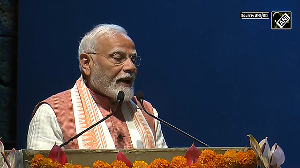Michelin plan to stay in Formula One despite the fact that the teams using their tyres did not race in Sunday's US Grand Prix over safety concerns.
"I really don't believe this will have an effect on Michelin's future in Formula One," Michelin's deputy director of competition Frederic Henry-Biabaud said on Monday.
The French company, which provides tyres to seven of the 10 F1 teams, instructed the teams not to start the race after two Toyotas had crashed in free practice on Friday because of sudden tyre failure.
As a result, only the six cars racing on Bridgestone tyres started the race at Indianapolis, which was won by world champion Michael Schumacher, driving a Ferrari.
The fiasco seriously damaged the image of Formula One, which presents itself as a showcase for high-tech excellence.
"We are convinced our decision was a professional and a responsible one in line with our policy of 100 percent safety," said Henry-Biabaud.
"We deeply regret what happened and we feel particularly sorry for the fans. We regret the consequences of this but we certainly do not regret our decision."
Michelin checked the tyres all night after Friday's crashes, conducting tests in the United States but also on similar tyres in France, before coming to the conclusion that they were not absolutely safe.
New tyres brought in by Michelin from France were then ruled out after tests by the company.
"The investigations are not over yet," said Henry-Biabaud. "We are aware that there is a problem but we have not yet precisely identified it."
Michelin said the race could have gone ahead with all cars had FIA accepted to build a temporary chicane before the slingshot final banked corner to reduce speeds and lessen the huge forces on the rear left tyres.
"We believe that it [building a chicane] was realistic and feasible but, for their own reasons, the sport's officials ruled it out," Henry-Biabaud said.
"It is too early to say what consequences this will have but our partners were very supportive and we are confident our decision will have been understood, especially in the United States, where safety is of paramount importance," he added.








 © 2025
© 2025